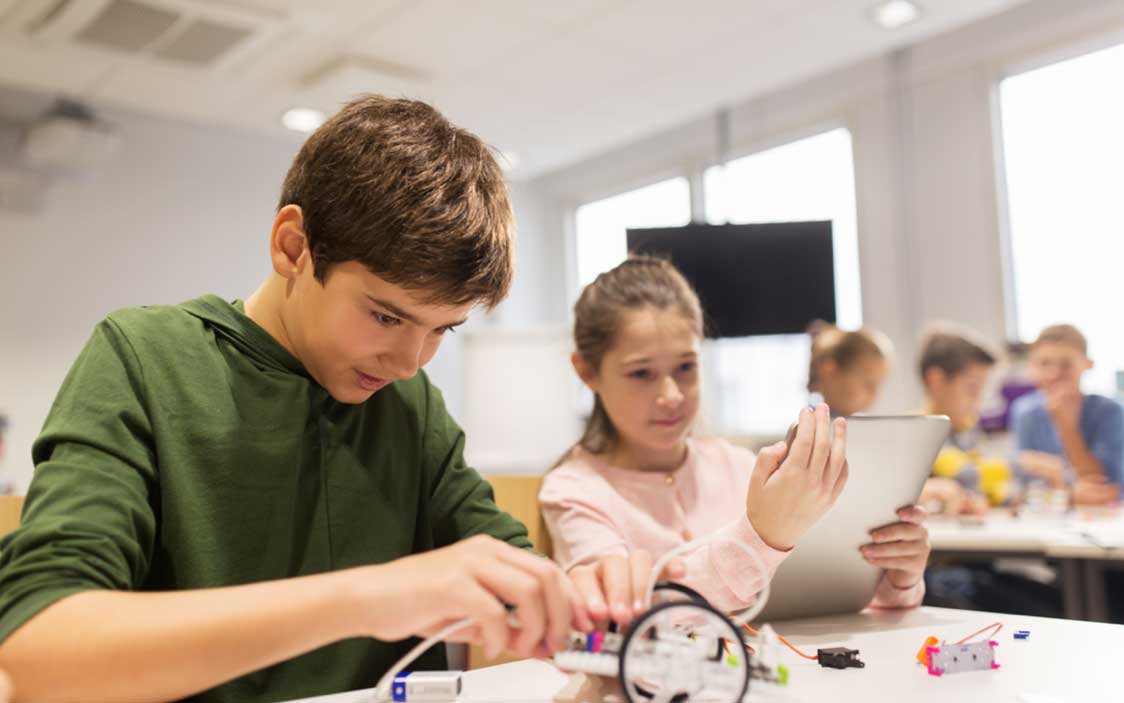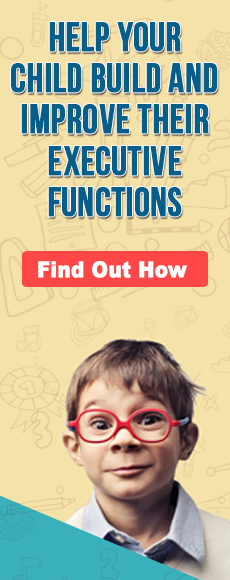
Focus Activities
You may wonder why your child can’t sit still long enough to read a chapter in a book but can play a video game all day long. Focus is the thinking skill practiced the most when kids are engaged in screen time, but none of that practice really counts until you get involved. Talking about and playing video games with your kids not only gives them validation and support, it offers you opportunities to help them reflect on and make connections between the skills they use in the game and the skills they use in the real world. You can help them take their focus practice to the next level by working on one or more of these activities together.
Task Initiation
Your child might respond well to competition or “limited time offers” as strategies to help them get started on tasks and projects. With a large digital clock visible, challenge your child to focus and work as hard as they can for a short period of time (10 to 15 minutes). Another task initiation strategy is to have your child write down the start and finish times for an assignment. Just as mindful of food intake can mean eating healthier foods and healthier portions, keeping track of how long something takes can increase your child’s awareness of the importance of getting started.
Have your child teach you how to start something they know how to do, such as a computer game, a puzzle, or installing an app on a smartphone. Ask for details and encourage them to explaining from the very beginning of the process, as if you are a small child who has never seen a puzzle or a mobile device before. Have them explain even the most basic steps, such as how to push a power button, how to move a mouse, or how to navigate to the app store.
Whenever possible, help your child find ways to make chores and homework more engaging. Help them hunt down an interesting book for a report or offer outdoor chores to a more active child. Using an app like HabitRPG, ChoreMonster, or SuperBetter can turn mundane daily activities into fun little quests. Making homework more interesting can be a daunting task, but ask your child’s teacher for suggestions or find ideas for using stimulating digital technologies. There are many Internet-based homework sites (like BrainPOP) and audiovisual supplements (books on tape, web-based research, science/history television shows) that can make schoolwork more enjoyable.
Big projects and bad messes can overwhelm anyone. Help your child learn how to take things step-by-step. If their bedroom looks as if a hurricane hit it, point them toward where to start (say, picking up all the clothes first or rescuing the homework before it gets anymore tattered). The next step might be to return all dishes to the kitchen or getting toys in their bins. Use your smartphone to help your child take some before and after pictures detailing each step of the job. These could be kept in an online album or printed and posted on the back of the door to be used as a visual guide to cleaning the room next time.
Sustained Attention
Psychologists call this the Premack Principle; people will usually perform a less desirable activity if it leads to a more desirable activity in the end. You employ the Premack Principle when you tell your child that they can only have dessert after she has eaten her dinner. Help your child employ this strategy on her own by arranging activities she enjoys following dull and boring chores. Talk about how finishing a mundane task quickly means watching her favorite television show, reading a book, or getting to play outside. Encourage her to think of new ways she might use this type of incentive to complete homework or chores efficiently. Using an app like HabitRPG, ChoreMonster, or SuperBetter can help.
Challenge your child to a race. Tell your child to see whether they can fully complete a portion of their homework before you finish putting away the groceries after shopping. Encourage naturally competitive children to come up with strategies for competing against themselves or others. Engage siblings, friends or other caregivers in these friendly contests.
Simon Says, Memory and card games like Go Fish challenge children to observe, remember and either repeat or use what they have seen during game play. If your child wins, ask them to tell you about strategies that helped them to be successful in the game. Reinforcing your child’s efforts in learning and playing the games can be a helpful and fun way to practice sustained attention.
Encourage activities that involve social interaction and service to others. Volunteer for activities that involve assisting others and that are often self-rewarding while engaging your child’s attention. Hands-on opportunities such as Habitat for Humanity, Scouting or environmental clean-up days are often very positive experiences for engaging, sustaining, and maintaining attention. Encourage your child to talk about the components of these activities that keep her involved and to use these as guides for the selection of later activities and jobs.
Building Persistence
Many children who find it hard to persist on tasks implicitly believe that failures are due to either a lack of ability or forces totally outside of their control. They believe they cannot succeed no matter how hard they try. It is extremely important to help these children to see how their efforts are paying off. Help them to make the vital connection that success is attributed to effective strategies and sustained effort. Talk frequently with your child about ways she can identify and own her behaviors that have led to progress and favorable outcomes. Positive psychology apps like SuperBetter and Everest and games like Thomas Was Alone and Ori and the Blind Forest can be good resources for improving outlooks.
If your child has difficulty facing large tasks, help them practice taking on smaller tasks that involve one or two steps. A child overwhelmed by a LEGOs project with 600 pieces will do far better starting with a Bionics set of 70 to 80 pieces. Have your child read books one chapter at a time (use a binder clip to cordon off the remainder), build a model one day and make a plan to paint it the next day, and tackle messy bedrooms by completing a list of individual tasks (picking up clothes, putting away books and papers, dusting). Discuss how most great accomplishments — the Sistine Chapel or earning an Olympic medal — require persistence and almost always involve overcoming some adversity.
Help your child experience the tangible results of sticking to a task by emphasizing rewards. Children who are trying to save money to buy a particular toy or game are likely to benefit from a bit of help from their parents so that they can get it in a shorter amount of time. Point out and discuss how their persistence in “sticking to it” inspired your contribution. An app like HabitRPG or ChoreMonster can help you set real-world rewards in a game-like environment that makes daily tasks more fun.
Help your child to develop self-verbalization skills that will assist her with metacognition. Ask questions such as “Can you think of another way of doing that?” or “How do you think others might have solved that problem?” Encourage her to ask these questions herself rather than depending upon external prompts. And encourage her to think about and discuss ways she has successfully completed difficult tasks in the past.




